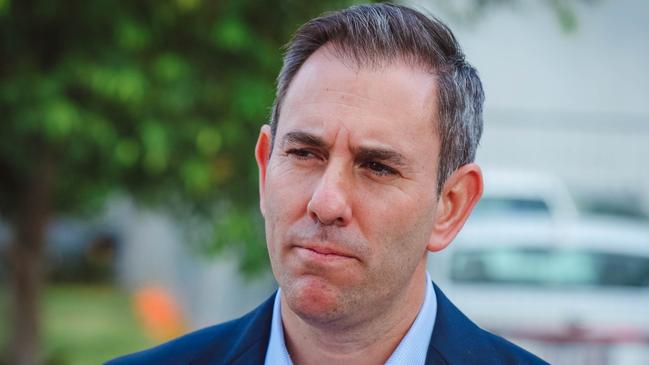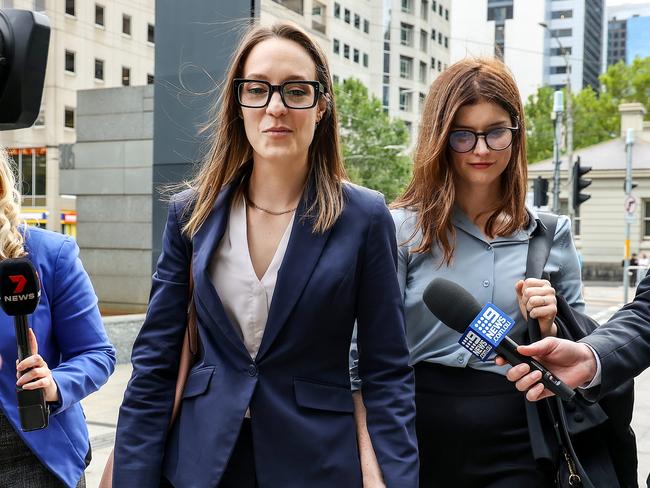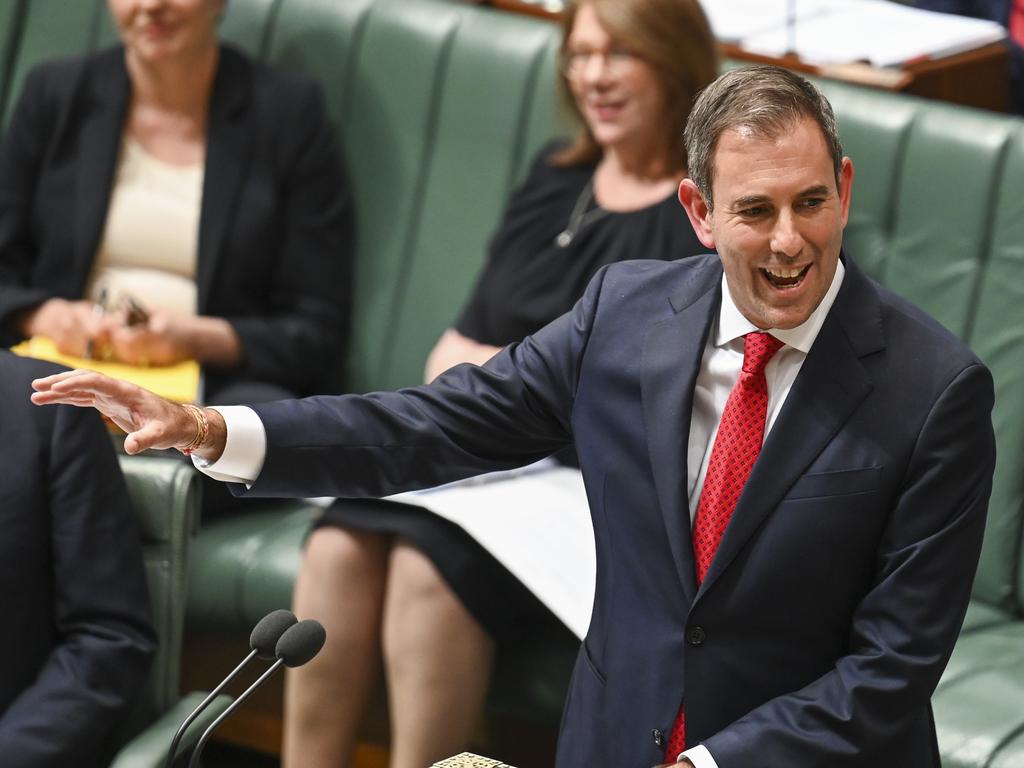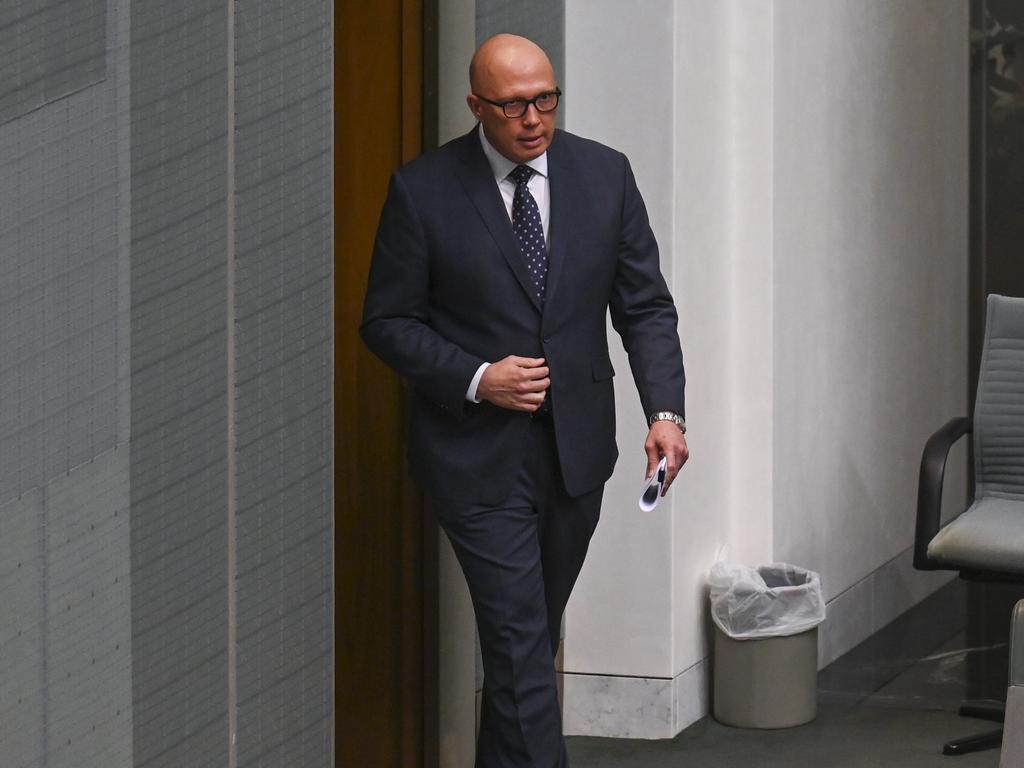If a Labor government can’t spend up big, what’s left for it to do?
You can see the ideal Labor campaign now: we delivered the voice, we’ve handed down two surpluses in a row, re-elect us to finish the job we’ve started. But it squibs the hard yards.

It didn’t happen. After enduring Coalition governments for 20 of the past 26 years, Labor MPs understandably are keen to enact some serious policy redistribution. One gets the impression Jim Chalmers wanted to deliver an old-style Labor budget – filled with expensive major reforms. But the state of the economy prevented him from doing so. That squib is therefore understandable, even if Labor’s ideological left flank doesn’t agree.
High inflation took the opportunity away. Yes, there was some inflationary spending – to the tune of about $30bn no less – but it had to be tempered by the reality of stubbornly high inflation that the Reserve Bank doesn’t think will drop back to within the 2-3 per cent band until mid-2025.
If a new Labor government can’t spend up big, what’s left for it to do? Responsibly, it should instead embark on overdue and necessary economic reforms: to modernise the tax system and the compact between the federal government and the states; to drive efficiencies and optimise the way we tax. There is so much to be done in this space.
Labor embarked on major economic reforms shortly after winning the 1983 election. John Howard did similarly following his 1996 victory. New governments have a very small window for such game-changing actions, early in their first term when their popularity is at its zenith.
Because it didn’t happen this week, the Albanese government has missed its chance to replicate the great reforming traditions of the past. The next budget may well be the last before an election as early as late next year. The context of a looming election will increase how political budgets forthwith are likely to be.
The Treasurer may have written his PhD on the leadership Paul Keating showed throughout his political career, but he certainly didn’t emulate it on Tuesday night. It was a small-target budget.
To be sure, it’s not a bad budget; it’s just not a particularly good one either. In the black-and-white world of partisan politics, choices can become all too binary. Liberals say the budget is a train wreck: stoking inflation and failing to apply long-term fiscal discipline. It does some of that, but certainly not to the degree claimed. Labor argues that it has calibrated the budget perfectly, the Treasurer’s not-so-humble brag: “It’s very carefully targeted, very carefully calibrated.” At least Chalmers’ self-confidence remains firmly intact.
The return to surplus is much ado about nothing. For a start it’s a current financial year surplus that wasn’t forecast. It eventuated because of higher-than-expected commodity prices and immigration levels. Next financial year and right across the forward estimates there are wall-to-wall deficits. Wayne Swan also delivered a surplus in the financial year 2007-08 when he stood up to deliver his first budget in May 2008. The final budget outcome revealed a $19.7bn surplus for that financial year. Few people remember that because he went on to deliver nothing but deficits thereafter.
Having said that, the small surplus Chalmers announced is politically meaningful simply because the Coalition claimed to be back in black when it wasn’t and it likes to rib Labor for not being capable of delivering a surplus.
While next financial year is forecast to see a return to deficit, courtesy of an expected economic downturn, it’s not out of the realm of possibility that commodity prices exceed expectations again, delivering a surprise second surplus. That would be political manna from heaven for Labor, likely to lock the election in for later next year. You can see the Labor campaign now: we delivered the voice (assuming it does), we’ve handed down two surpluses in a row (assuming it does), re-elect us to finish the job we’ve started as the inflation genie returns into the bottle.
Superficially, it’s a fabulous narrative. The vacuous and the ideologically captured sections of the gallery will lap it up. But for anyone interested in substance, there won’t be too much to see. Perhaps we will see a large-scale package as a pre-election document, but don’t hold your breath.
It will be interesting to see if Labor amends the stage three income tax cuts between now and when they are due to take effect mid next year. There is still an opportunity to pare them back, but the real opportunity to do so was as part of wider tax reform, which is what Tuesday’s budget should have laid out. If anything, this week Labor firmed up its support for the legislated stage three cuts.

Because budget week draws so much attention, it’s also a good time to “take out the trash” – a line used in the old TV show The West Wing, referring to the practice of dumping bad news at a time designed to receive minimal attention.
Week to week, that’s usually late Friday afternoons. Big events that act as a distraction are even better. The trash taken out during budget week included Sally Rugg settling her legal case against former employers Monique Ryan and the commonwealth for $100,000, with each side bearing their own costs. Which would easily amount to more than the settlement. It was the same offer team Rugg rejected very early on.
So much for the great workplace test case Rugg’s lawyer had been chest-thumping about in the media.
The allegation was that she was expected to work unreasonable overtime. The public legal slanging match was bruising for all sides, with untidy revelations, such as that Rugg took a flight home despite having just contracted Covid-19. The judge even described submissions by Rugg as having “a high degree of unreality to them”. Ryan said she had lost “all trust and confidence” in her former chief of staff, whose submissions included a litany of allegations based on private conversations. Notwithstanding the sense of entitlement that was present, it’s hard not to feel a little sorry for Rugg, who clearly bit off more than she could chew.
In the end, money talked, and not very much of it. Principles matter only when they are inconveniently applied. In Rugg’s case, standing on principle to create a test case became all too inconvenient.
The following day it was revealed in this newspaper the former chief of staff had accepted a role as media lead at Amnesty International Australia, which itself is under fire for failing to disclose the hacking of its donor list before the media revealed the cover-up. Let’s hope there isn’t too much overtime required in the new role mopping up Amnesty’s damaged reputation.
Peter van Onselen is a professor of politics and public policy at the University of Western Australia and Griffith University.








There was a missed opportunity in Tuesday’s budget. A new government riding high in the opinion polls should embrace serious and difficult reforms for the good of the nation. That’s the responsibility that comes with holding high office.